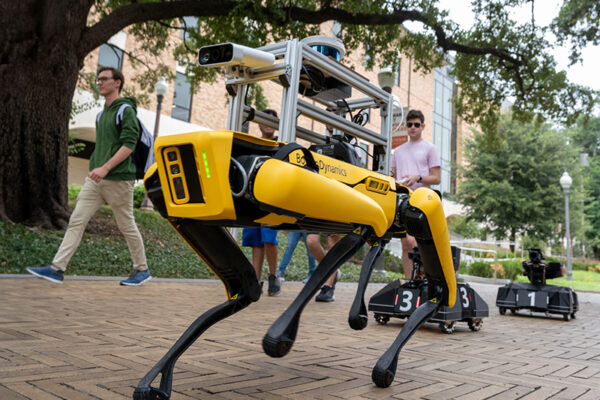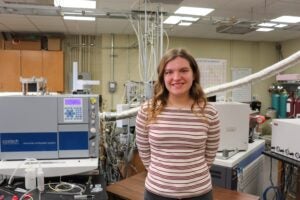With signature events covering all aspects of artificial intelligence, new industry and government partnerships, the inaugural cohort of a first-of-its-kind online master’s degree in AI and continued research breakthroughs, The University of Texas at Austin will prioritize AI research and education in 2024. UT will put our leadership and expertise on display throughout the year, while creating even more opportunities for collaborations across and beyond campus.
“We are in the midst of an incredible time in artificial intelligence, and the wide-ranging applications are encouraging us to expand our notions of how we can change the world,” said Dan Jaffe, UT’s vice president for research, scholarship and creative endeavors. “At UT, we are exploring the boundaries in every realm of AI. And with expertise and excitement across the University, we are designating 2024 as the ‘Year of AI.’”
For at least five decades, Longhorns have been at the forefront of AI technologies, and UT Austin has been home to some of the biggest pioneers in the field. In the 1960s, Woody Bledsoe, who developed the first version of facial recognition technology, and Bob Simmons, an innovator in natural language processing, joined the faculty at UT, where they stayed for the remainder of their careers and jumpstarted AI research on the Forty Acres.
Since then, the University has opened dozens of labs, research centers and initiatives, and brought hundreds of faculty, staff and students to campus to advance AI and related fields. UT has become known as a global leader in AI — from our sought-after thought leaders; to our collaborative, cross-disciplinary projects and breakthroughs in research; to our new degree and learning opportunities; to our understanding of the ethical and societal impacts; to how we’re approaching AI in the classroom.
And in 2024, UT will further build upon this foundation and strength, including hosting or participating in several events throughout the year. In early February, the annual conference of the Texas Academy of Medicine, Engineering, Science & Technology will focus on AI and machine learning and will be held on campus. In addition to seminars and speaker events, we will also have a significant AI presence at SXSW with faculty members represented during the week and on panels at UT’s SXSW activation March 8-9.
The Year of AI is bolstered by several new programs and recurring recognitions over the last few years. For one, the University is consistently regarded and highly ranked for our programs in artificial intelligence, ranking in the top 10 in U.S. News and World Report’s undergraduate and graduate rankings. Most of that work is supported by UT’s Texas Advanced Computing Center, which is home to three of the top 10 fastest university supercomputers — all powered by partnership with Dell Technologies.
In January 2023, we announced the launch of a new online master’s program in AI, the first large-scale degree program of its kind and the only master’s degree program in AI from a top-ranked institution priced close to $10,000. This new program, along with UT’s existing online master’s programs in computer science and data science, provide a comprehensive set of AI-related programs and courses offered across campus.
In 2020, the National Science Foundation selected UT Austin to lead the $20 million NSF AI Institute for Foundations of Machine Learning. At the same time, the University established the Machine Learning Laboratory with a $5 million gift from alumni Zaib and Amir Husain.
Cross-disciplinary research collaborations between these groups, UT colleges and schools, and campus-wide hubs like the Oden Institute for Computational Engineering and Sciences are driving rapid advances in many areas. In 2022, a $10 million gift from Dheeraj and Swapna Pandey launched a new partnership in computational oncology and machine learning, and a leadership investment from alumnus Sanjay Chandra and his family created new research pathways for AI in the Chandra Family Department of Electrical and Computer Engineering.
And in 2019, the University launched Good Systems, a cross-campus grand challenge initiative aimed at designing ethical AI technologies that benefit society.
“UT Austin has always been strong in the core areas of artificial intelligence,” said Bruce Porter, professor of computer science and chief science officer at SparkCognition. “This campus is where the talent and expertise come together – neural science, mathematics, statistics, data science and more — we have strength in every area.”




